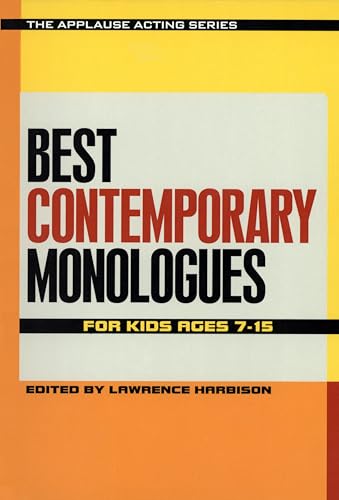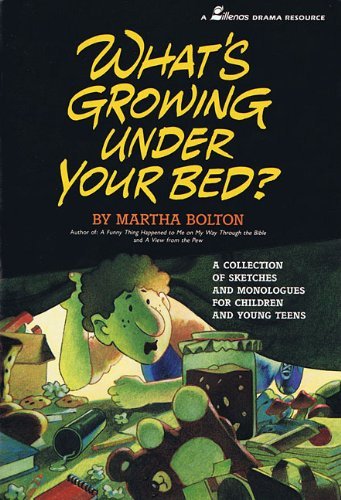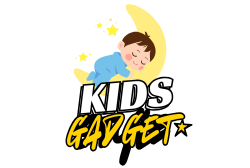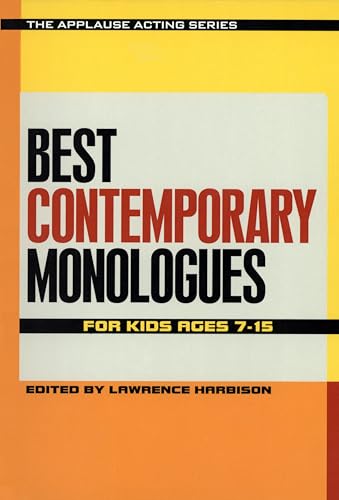Hey there, parents and aspiring young actors! Is your child ready to step into the spotlight, explore their creativity, or maybe even land that dream role? Monologues are a fantastic way for kids to develop their acting chops, build confidence, and truly shine. Whether it’s for an audition, a drama club performance, or just for fun at home, finding the best monologues for kids can make all the difference.
It’s not just about memorizing lines; it’s about understanding character, conveying emotion, and captivating an audience. But with so many options out there, how do you pick the perfect one? Don’t worry, we’ve got you covered! We’ve scoured the best resources to bring you a hand-picked list of the top monologue books that’ll help your child unleash their inner star. While our primary focus is on solo pieces, we’ve also included a couple of fantastic resources that offer a mix of scenes and monologues, or even just scenes, because strong scene work often goes hand-in-hand with powerful monologue delivery.
Let’s dive in and discover some amazing material for your young performer!
Why Monologues Matter for Young Actors
Monologues are more than just lines; they’re tiny plays in themselves, offering a unique opportunity for young performers to:
* Develop Character: Step into someone else’s shoes and explore different personalities.
* Boost Confidence: Command the stage all by themselves, learning to project their voice and presence.
* Improve Memory: A great exercise for cognitive skills.
* Refine Acting Skills: Practice emotional range, vocal variety, and physical expression.
* Prepare for Auditions: Many youth theater and school play auditions require a short monologue.
How to Choose the Right Monologue
When picking a monologue, consider these points to ensure it’s a great fit for your child:
* Age-Appropriate: The themes and language should be suitable for their age.
* Relatability: It’s often easier for kids to connect with characters and situations they understand.
* Length: For auditions, short and punchy is usually best (1-2 minutes).
* Comedy or Drama: Does your child shine more with humor or heartfelt emotion?
* Character Arc: Even a short monologue can show a small journey or change in the character’s thoughts.
Our Top 7 Picks for Kids’ Monologues
Let’s get to the good stuff! Here are our reviews of some of the best monologues for kids available today.
1. Best Contemporary Monologues for Kids Ages 7-15 (Applause Acting Series)

This book is a gem for young actors looking for modern, relatable material. It’s packed with fresh, engaging pieces that resonate with today’s kids, making it easier for them to connect with the characters and truly bring the words to life. The monologues cover a wide range of emotions and situations, perfect for children aged 7 to 15 who are ready to tackle contemporary themes in a natural and authentic way.
-
Key Features:
- Specifically curated for ages 7-15, ensuring age-appropriate content.
- Focuses on contemporary themes and language, making it highly relatable.
- Includes both comedic and dramatic pieces for versatility.
- Offers guidance for young actors on how to approach their monologues.
- Part of the trusted Applause Acting Series.
-
Pros:
- Excellent for auditions due to modern relevance.
- Great variety of characters and situations.
- Helps kids develop a natural, conversational acting style.
- Challenges older kids while remaining accessible for younger ones.
-
Cons:
- Some themes, while contemporary, might require parent-child discussion.
- Might be a bit too “serious” for kids who only want pure silliness.
-
User Impressions: Parents and drama teachers rave about how current and engaging these monologues are. Many find it to be a go-to resource for audition material that truly stands out. Young actors appreciate the opportunity to portray characters that feel like themselves or their friends.
2. Monologues for Kids and Tweens II: 100 New Comedy and Drama Monologues

If quantity and variety are what you’re after, look no further! This fantastic collection boasts a whopping 100 new monologues, offering an incredible range of comedic and dramatic options. It’s perfect for kids and tweens who love to explore different facets of their acting ability, whether they’re aiming to make an audience roar with laughter or move them with a poignant story. With so many choices, your child is bound to find several pieces that truly speak to them.
-
Key Features:
- An extensive collection of 100 brand-new monologues.
- Balanced mix of comedy and drama for diverse skill development.
- Designed specifically for kids and tweens, ensuring suitability.
- Monologues vary in length, ideal for different performance needs.
- Provides ample material for ongoing practice and skill refinement.
-
Pros:
- Huge selection means there’s something for every young actor.
- Great value for money given the volume of content.
- Excellent for developing comedic timing and dramatic depth.
- Ideal for drama teachers and youth groups needing multiple options.
-
Cons:
- With 100 monologues, the quality can vary slightly between pieces.
- Might feel overwhelming for very young or indecisive actors.
-
User Impressions: Reviewers often highlight the sheer volume of choices and the fresh, engaging content. Kids adore the funny monologues, while teachers appreciate the wide array of options for diverse student personalities and acting challenges. It’s considered a staple for many acting coaches.
3. What’s Growing Under Your Bed?: A Collection of Sketches, Monologues, and Short Scenes for Kids and Tweens

Ready for something truly unique and imaginative? This collection offers more than just monologues; it’s a delightful mix of sketches and short scenes too, making it a versatile addition to any young actor’s library. The title alone hints at the quirky, creative content within, perfect for kids and tweens who love to explore whimsical scenarios and offbeat characters. It’s a fantastic resource for sparking creativity and offering a broader range of acting experiences.
-
Key Features:
- Includes sketches, monologues, and short scenes in one volume.
- Focuses on imaginative, humorous, and creative scenarios.
- Suitable for both individual practice and group work.
- Designed to be engaging and fun for kids and tweens.
- Encourages out-of-the-box thinking and character development.
-
Pros:
- Offers diverse acting opportunities beyond just monologues.
- Great for developing comedic timing and improvisational skills.
- Perfect for drama classes, youth groups, or family fun.
- Inspires creativity with its unique and often silly premises.
-
Cons:
- If you’re strictly looking for traditional monologues, this might offer fewer.
- Some pieces might lean heavily into comedic, slightly absurd situations.
-
User Impressions: Users love the fun, lighthearted nature of the material, often praising it for making acting practice enjoyable. It’s frequently recommended by teachers for its versatility and ability to get kids excited about performing. The sketches are a particular hit for group activities.
4. Acting Scenes for Kids and Tweens: 60 Original Comedy and Drama Scenes and Monologues

This book is a fantastic all-rounder for young performers, offering a rich blend of 60 original comedy and drama pieces. It cleverly combines scenes with monologues, giving kids the chance to practice both solo performance and collaborative acting. Whether your child needs material for an audition, a class project, or just to hone their general acting prowess, this collection provides plenty of fresh, engaging content that caters to various moods and character types.
-
Key Features:
- Contains 60 original pieces, a balanced mix of scenes and monologues.
- Covers both comedy and drama genres, offering diverse acting challenges.
- Material is specifically tailored for kids and tweens.
- Provides fresh, contemporary content not typically found elsewhere.
- Ideal for developing a wide range of acting skills.
-
Pros:
- Excellent for versatility, allowing practice for both solo and paired work.
- Original content means less chance of encountering overused pieces.
- Good for developing both comedic timing and dramatic interpretation.
- A valuable resource for both individual actors and drama coaches.
-
Cons:
- If the primary need is solely for monologues, a significant portion will be scenes.
- Might require careful selection to ensure a piece perfectly fits audition requirements.
-
User Impressions: Many appreciate the fresh and original material, noting that it helps young actors stand out. Teachers find it incredibly useful for classwork, providing engaging scripts that resonate with students. The blend of scenes and monologues is often highlighted as a major benefit.
5. More Short Scenes and Monologues for Middle School Actors

As kids transition into their middle school years, their interests and emotional range evolve. This book is expertly designed to meet those changing needs, offering short scenes and monologues specifically crafted for this age group. The content addresses themes and situations relevant to pre-teens and young teenagers, providing material that feels authentic and allows them to explore more complex characters and ideas. It’s perfect for students seeking impactful, age-appropriate pieces.
-
Key Features:
- Specifically targets middle school actors, addressing their unique developmental stage.
- Features short, manageable scenes and monologues.
- Explores relevant and relatable themes for pre-teens and young teens.
- Offers a mix of comedic and dramatic options.
- Ideal for school drama programs and competitive events.
-
Pros:
- Perfectly tailored content for the middle school demographic.
- Short pieces are excellent for auditions or quick practice.
- Helps bridge the gap between elementary and high school material.
- Addresses slightly more mature themes in an appropriate way.
-
Cons:
- May not be suitable for younger children due to thematic content.
- The “short” nature might mean less depth for more advanced actors seeking longer pieces.
-
User Impressions: This book consistently receives praise for its spot-on relevance to middle schoolers. Teachers and parents alike commend it for providing material that students genuinely connect with, helping them deliver more authentic and powerful performances. It’s often called a “must-have” for this age group.
6. Magnificent Monologues for Kids (Hollywood 101)

For young actors dreaming of the big stage or screen, Magnificent Monologues for Kids is an inspiring choice. This book is part of the “Hollywood 101” series, suggesting a focus on material that helps young performers develop the kind of skills needed in professional acting. It’s designed to empower children with engaging stories and characters, building their confidence and stage presence. These monologues are crafted to be impactful, helping kids truly shine when it’s their turn in the spotlight.
-
Key Features:
- Specifically focuses on developing solo performance skills.
- Offers engaging, well-crafted stories and characters.
- Aims to build confidence and stage presence in young actors.
- Part of the “Hollywood 101” series, implying professional insight.
- Designed for kids who are serious about acting.
-
Pros:
- Excellent for building foundational acting skills.
- Monologues are often impactful and memorable.
- Helps young actors understand character motivation and delivery.
- Great for auditions where a strong solo piece is required.
-
Cons:
- Might contain fewer monologues compared to larger collections.
- Some pieces might require a bit more dramatic interpretation than light comedy.
-
User Impressions: Users often mention how these monologues feel “professional” yet totally accessible for kids. Many appreciate the quality of the writing and how it helps young actors delve deeply into their characters. It’s a favorite for those aiming for more serious acting endeavors.
7. The Best Scenes for Kids Ages 7-15 (Applause Acting Series)

While the main focus of our list is best monologues for kids, it’s crucial to acknowledge that robust acting skills involve more than just solo pieces. This excellent resource from the Applause Acting Series is a fantastic complement, focusing primarily on scenes for kids aged 7-15. Engaging in scene work helps young actors develop crucial skills like listening, reacting, and collaborating with a partner – all of which significantly enhance their ability to deliver powerful monologues. It’s a wonderful way to broaden their acting toolkit and prepare them for any theatrical challenge.
-
Key Features:
- Primarily a collection of engaging scenes for two or more actors.
- Covers a wide age range from 7 to 15 years old.
- Offers a diverse array of themes and character dynamics.
- Part of the highly reputable Applause Acting Series.
- Excellent for developing collaborative acting skills.
-
Pros:
- Builds essential listening and reaction skills vital for all acting.
- Provides fantastic material for partner work in classes or workshops.
- High-quality scripts from a respected publisher.
- Expands a young actor’s repertoire beyond solo pieces.
-
Cons:
- Not a dedicated monologue book, so if only monologues are needed, it’s not the primary fit.
- Requires a scene partner for full utilization.
-
User Impressions: Teachers and parents frequently commend this book for its well-written scenes and its ability to foster teamwork and dynamic interaction. It’s often used as a core text in drama classes to help kids understand character relationships and stage blocking. Many find it invaluable for a well-rounded acting education.
Ready, Set, Act!
Finding the best monologues for kids can truly ignite a passion for performance and help young actors develop invaluable life skills. From building confidence to understanding human emotions, the journey of bringing a character to life is incredibly rewarding. We hope this curated list gives you a fantastic starting point for finding that perfect piece to help your child shine. Break a leg!
FAQ Section
Q1: What makes a good monologue for a child?
A: A good monologue for a child is age-appropriate in language and theme, relatable, and allows them to showcase a range of emotions or a clear objective. It should also be a manageable length (usually 1-2 minutes for auditions) and free of complex or adult situations.
Q2: How long should a child’s monologue be for an audition?
A: For most children’s auditions, a monologue should be short and punchy, typically lasting between 1 to 2 minutes. This gives casting directors a good sense of their abilities without taking up too much time.
Q3: Where can kids perform monologues?
A: Kids can perform monologues in many settings: school plays, drama club showcases, local youth theater auditions, acting classes, talent shows, or even just for family and friends at home. It’s great practice for building confidence!
Q4: Are these monologues suitable for auditions?
A: Absolutely! Many of the books reviewed here are specifically designed with auditions in mind, offering diverse, age-appropriate, and engaging material that can help a young actor stand out. Always check the specific requirements of the audition, such as length or genre preference.
Q5: How can I help my child memorize a monologue effectively?
A: Try breaking it down into smaller sections, understanding the character’s motivation for each line, and practicing in different ways (e.g., in front of a mirror, recording themselves, saying it while doing chores). Don’t just focus on lines; help them visualize the scene and their character’s feelings.
Q6: Should my child choose a comedic or dramatic monologue?
A: This depends on the audition’s requirements and your child’s strengths. If they naturally gravitate towards humor, a comedic monologue can show off their timing and charm. If they’re more expressive with deeper emotions, a dramatic piece might be better. Sometimes, having one of each prepared is a good strategy.
Q7: What’s the difference between a monologue and a scene?
A: A monologue is a speech delivered by one character alone, expressing their thoughts or addressing the audience (or an implied character). A scene, on the other hand, involves two or more characters interacting through dialogue, building a story through their exchanges. Both are vital for developing comprehensive acting skills.
Q8: Can beginners use these monologue books?
A: Yes! Most of these books are designed to be accessible for beginners while still offering enough depth for more experienced young actors. Many include tips or a variety of pieces that allow a child to start with simpler monologues and gradually challenge themselves with more complex ones.

